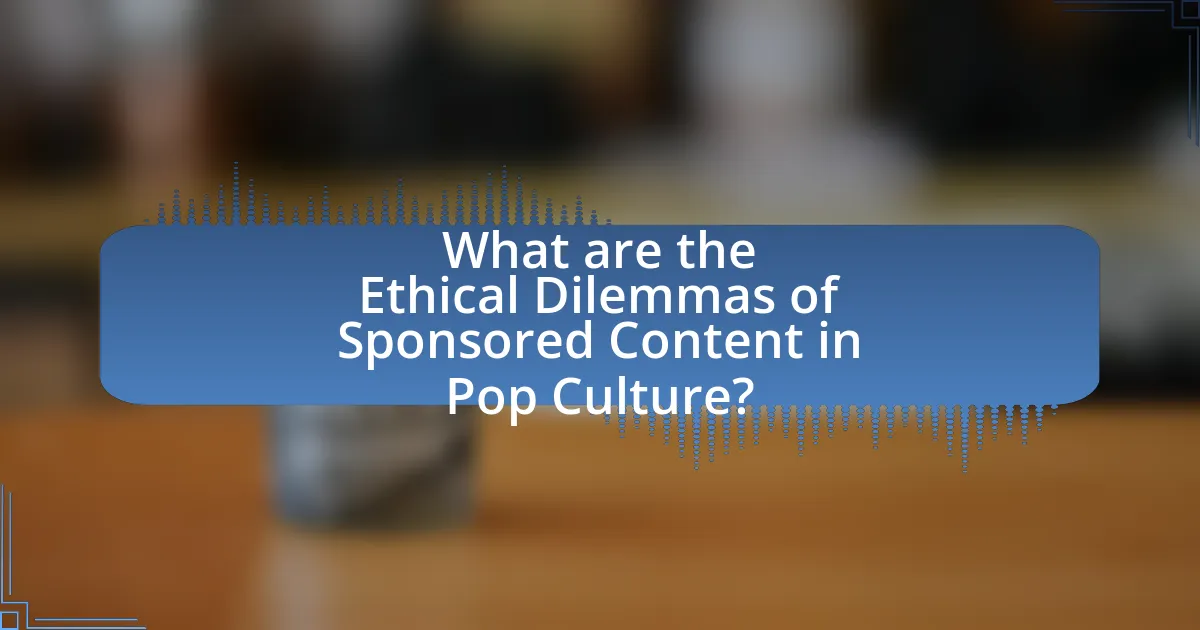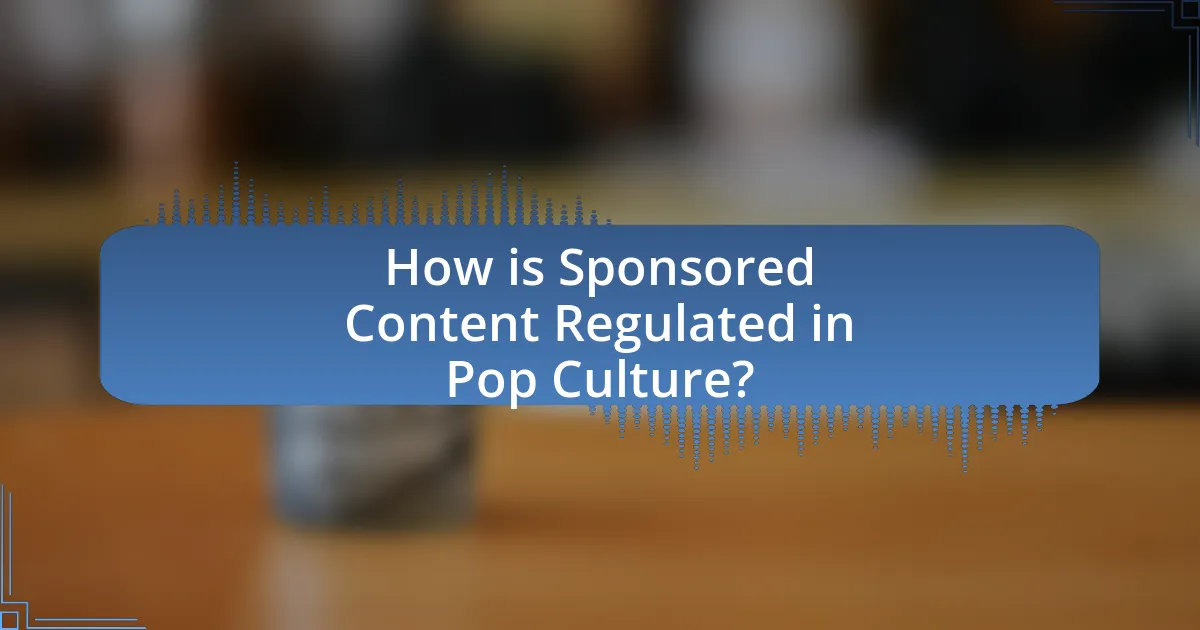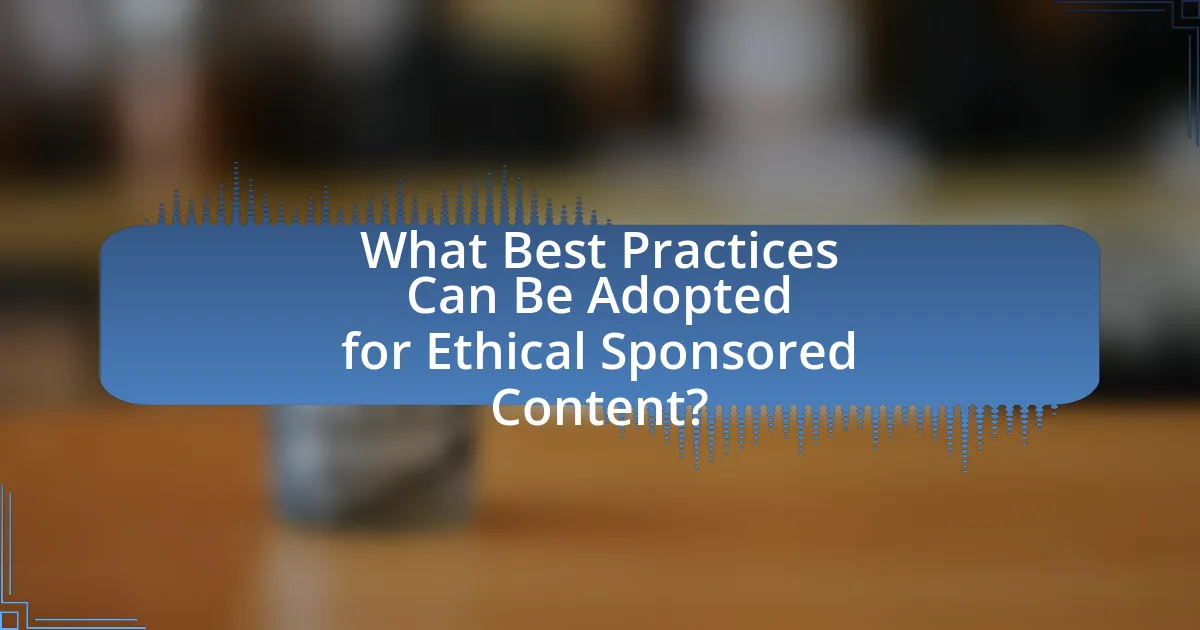The article examines the ethical dilemmas associated with sponsored content in pop culture, focusing on issues of transparency, authenticity, and consumer manipulation. It highlights how sponsored content can blur the lines between advertising and entertainment, potentially leading to consumer deception and a loss of trust in creators and brands. Key discussions include the psychological effects of sponsored content on consumer perception, the importance of clear labeling and disclosure, and the regulatory frameworks established by organizations like the Federal Trade Commission. Additionally, the article addresses the challenges of differentiating sponsored content from organic content and explores best practices for maintaining ethical standards in advertising.

What are the Ethical Dilemmas of Sponsored Content in Pop Culture?
The ethical dilemmas of sponsored content in pop culture primarily revolve around transparency, authenticity, and consumer manipulation. Sponsored content often blurs the lines between entertainment and advertising, leading to potential deception where audiences may not recognize that they are being marketed to. This lack of transparency can undermine trust in creators and platforms, as evidenced by studies showing that consumers are more likely to engage with content they perceive as authentic. Furthermore, the ethical implications extend to the potential for promoting harmful products or ideologies, as seen in cases where influencers endorse unhealthy lifestyles or products without disclosing sponsorship. These dilemmas highlight the need for clear guidelines and ethical standards in the creation and dissemination of sponsored content to protect consumers and maintain integrity in pop culture.
How does sponsored content influence audience perception?
Sponsored content significantly influences audience perception by blurring the lines between advertising and editorial content, leading to altered trust levels and brand associations. Research indicates that consumers often perceive sponsored content as more credible than traditional advertisements, as it is presented in a familiar format that aligns with their interests. A study by the American Press Institute found that 51% of respondents believed sponsored content was more trustworthy than standard ads, suggesting that this format can enhance the perceived authenticity of the message. Consequently, audiences may develop a more favorable view of the brand or product being promoted, impacting their purchasing decisions and overall brand loyalty.
What psychological effects does sponsored content have on consumers?
Sponsored content significantly influences consumer psychology by enhancing brand perception and increasing purchase intent. Research indicates that consumers often perceive sponsored content as more trustworthy and credible compared to traditional advertisements, leading to a higher likelihood of engagement. A study published in the Journal of Advertising Research found that 70% of consumers felt more positive about brands that used sponsored content effectively, demonstrating its impact on brand affinity. Additionally, the subtle integration of promotional messages within content can create a sense of familiarity and relatability, further driving consumer behavior.
How does transparency impact trust in sponsored content?
Transparency significantly enhances trust in sponsored content. When brands clearly disclose their sponsorships, audiences are more likely to perceive the content as credible and trustworthy. Research by the American Psychological Association indicates that transparency fosters a sense of authenticity, which is crucial for building consumer trust. In a study published in the Journal of Advertising Research, it was found that consumers are 60% more likely to trust content when they are informed about its sponsored nature. This demonstrates that transparency not only mitigates skepticism but also encourages a more positive reception of the content, ultimately leading to stronger brand loyalty.
Why is the distinction between advertising and content important?
The distinction between advertising and content is important because it affects consumer perception and trust. Advertising is typically promotional and aims to sell a product or service directly, while content provides value through information or entertainment without overtly pushing a sale. This difference influences how audiences engage with material; research indicates that 70% of consumers prefer to learn about a company through articles rather than ads, highlighting the effectiveness of content in building relationships. Understanding this distinction helps brands navigate ethical dilemmas in sponsored content, ensuring transparency and maintaining audience trust.
What challenges arise in differentiating sponsored content from organic content?
Differentiating sponsored content from organic content presents challenges primarily due to the subtlety of marketing techniques and audience perception. Sponsored content often mimics the style and tone of organic content, making it difficult for consumers to identify its promotional nature. Research indicates that 70% of consumers cannot distinguish between sponsored and organic content, highlighting the effectiveness of these marketing strategies in blending with regular content. Additionally, the lack of clear labeling or disclosure can further confuse audiences, leading to ethical concerns regarding transparency and trust in media.
How do different platforms handle the labeling of sponsored content?
Different platforms handle the labeling of sponsored content through specific guidelines and practices that ensure transparency. For instance, social media platforms like Instagram and Facebook require influencers to use clear disclosures such as #ad or #sponsored to indicate paid partnerships. Similarly, YouTube mandates creators to disclose sponsorships in their video descriptions or verbally within the content. These practices are enforced to comply with regulations set by organizations like the Federal Trade Commission (FTC), which emphasizes the importance of clear communication to prevent misleading consumers.
What are the potential consequences of unethical sponsored content?
Unethical sponsored content can lead to a loss of trust between consumers and brands. When consumers discover that content is misleading or lacks transparency, they may feel deceived, resulting in diminished brand loyalty and negative perceptions. Research indicates that 86% of consumers are concerned about the authenticity of sponsored content, which underscores the potential for backlash against brands that engage in unethical practices. Additionally, unethical sponsored content can lead to legal repercussions, as regulatory bodies like the Federal Trade Commission (FTC) impose penalties for failing to disclose sponsorships. This combination of eroded trust and potential legal issues highlights the serious consequences of unethical sponsored content.
How can misleading sponsored content affect brand reputation?
Misleading sponsored content can significantly damage brand reputation by eroding consumer trust. When brands engage in deceptive advertising practices, they risk alienating their audience, as consumers increasingly value transparency and authenticity. A study by the American Marketing Association found that 70% of consumers are less likely to trust a brand that uses misleading advertising. This decline in trust can lead to negative word-of-mouth, decreased customer loyalty, and ultimately, a decline in sales. Brands that prioritize ethical advertising practices are more likely to foster long-term relationships with their customers, reinforcing the importance of honesty in sponsored content.
What legal implications exist for failing to disclose sponsorships?
Failing to disclose sponsorships can lead to legal implications such as violations of advertising laws and regulations, including the Federal Trade Commission (FTC) guidelines in the United States. The FTC mandates that endorsements and sponsorships must be clearly disclosed to avoid misleading consumers. Non-compliance can result in penalties, including fines and legal action against the sponsor or the influencer. For instance, in 2017, the FTC settled with several influencers for not properly disclosing paid partnerships, emphasizing the legal requirement for transparency in sponsored content.

How is Sponsored Content Regulated in Pop Culture?
Sponsored content in pop culture is regulated primarily through guidelines established by the Federal Trade Commission (FTC) in the United States, which require clear disclosure of paid partnerships. The FTC mandates that influencers and brands must disclose when content is sponsored to ensure transparency and protect consumers from misleading advertising. This regulation is supported by the FTC’s enforcement actions and guidelines, which emphasize that disclosures should be “clear and conspicuous” to the audience. For example, the FTC’s “Guides Concerning the Use of Endorsements and Testimonials in Advertising” outlines specific requirements for disclosures, reinforcing the importance of honesty in advertising practices within pop culture.
What guidelines exist for ethical sponsored content?
Ethical sponsored content should adhere to transparency, authenticity, and audience respect. Transparency requires clear labeling of sponsored content to distinguish it from editorial content, ensuring that audiences understand the nature of the material. Authenticity involves creating content that aligns with the values and interests of both the brand and the audience, fostering trust. Respecting the audience means providing valuable, relevant information rather than solely promotional material. These guidelines are supported by the Federal Trade Commission (FTC), which emphasizes the importance of disclosure in advertising to prevent consumer deception.
How do organizations like the FTC regulate sponsored content?
Organizations like the FTC regulate sponsored content by enforcing guidelines that require clear disclosure of paid endorsements to protect consumers from misleading advertising. The FTC mandates that any material connection between advertisers and endorsers must be disclosed, ensuring that consumers can distinguish between paid content and organic opinions. This regulation is supported by the FTC’s “Guides Concerning the Use of Endorsements and Testimonials in Advertising,” which outlines specific requirements for transparency in advertising practices.
What role do industry standards play in shaping sponsored content practices?
Industry standards play a crucial role in shaping sponsored content practices by establishing guidelines that promote transparency and ethical behavior. These standards, often set by organizations such as the Federal Trade Commission (FTC) in the United States, require clear disclosures when content is sponsored, ensuring that audiences can distinguish between editorial and promotional material. For instance, the FTC’s guidelines mandate that sponsored content must be labeled as such, which helps maintain trust between consumers and brands. This regulatory framework not only influences how companies create and present sponsored content but also encourages adherence to ethical marketing practices, ultimately fostering a more responsible advertising environment.
How do cultural differences impact the perception of sponsored content?
Cultural differences significantly impact the perception of sponsored content by influencing how audiences interpret authenticity and trustworthiness. For instance, in collectivist cultures, such as Japan, consumers may view sponsored content more favorably when it aligns with community values and social harmony, whereas in individualistic cultures like the United States, personal expression and individual benefit are prioritized, leading to skepticism towards overtly promotional content. Research by the Pew Research Center indicates that cultural context shapes consumer attitudes, with 70% of respondents in collectivist societies expressing a preference for content that emphasizes group benefits over personal gain. This highlights that cultural norms dictate the effectiveness and acceptance of sponsored content, affecting its ethical implications in diverse markets.
What variations exist in sponsored content regulations across countries?
Sponsored content regulations vary significantly across countries, reflecting different legal frameworks and cultural attitudes towards advertising. In the United States, the Federal Trade Commission mandates clear disclosure of sponsored content to prevent misleading consumers, while in the European Union, the Audiovisual Media Services Directive requires similar transparency but allows for more nuanced interpretations based on member states’ laws. In contrast, countries like Australia have specific guidelines that emphasize the need for sponsorship disclosures, but enforcement can be less stringent. These variations highlight the diverse approaches to consumer protection and advertising ethics globally, influenced by local market practices and regulatory environments.
How do cultural attitudes towards advertising influence sponsored content effectiveness?
Cultural attitudes towards advertising significantly influence the effectiveness of sponsored content by shaping consumer perceptions and engagement levels. For instance, in cultures that prioritize authenticity and skepticism towards commercial messages, sponsored content that aligns with these values tends to resonate more, leading to higher engagement rates. Research indicates that consumers in collectivist cultures may respond better to sponsored content that emphasizes community and shared values, while individualistic cultures may prefer content that highlights personal benefits and individual success. A study published in the Journal of Advertising Research found that culturally congruent advertising increases trust and relatability, which are critical factors in the effectiveness of sponsored content.

What Best Practices Can Be Adopted for Ethical Sponsored Content?
Best practices for ethical sponsored content include transparency, clear labeling, and maintaining editorial integrity. Transparency involves disclosing the sponsorship to the audience, which builds trust and complies with regulations such as the Federal Trade Commission guidelines. Clear labeling, such as using terms like “sponsored” or “paid partnership,” ensures that consumers can easily identify promotional content. Maintaining editorial integrity means that the content should align with the publisher’s values and not compromise the quality or authenticity of the information presented. Research indicates that 70% of consumers prefer transparency in advertising, reinforcing the importance of these practices for ethical engagement in sponsored content.
How can creators ensure transparency in sponsored content?
Creators can ensure transparency in sponsored content by clearly disclosing any financial or material relationships with brands. This can be achieved by using explicit language such as “sponsored by” or “paid partnership” in the content itself, which aligns with guidelines set by regulatory bodies like the Federal Trade Commission (FTC). The FTC mandates that disclosures must be clear and conspicuous, ensuring that audiences understand the nature of the content. By adhering to these guidelines, creators not only comply with legal standards but also build trust with their audience, fostering a more ethical approach to sponsored content.
What are effective ways to disclose sponsorships to audiences?
Effective ways to disclose sponsorships to audiences include clear and prominent labeling of sponsored content, using terms like “sponsored by” or “paid partnership.” This transparency helps maintain trust and credibility with the audience. Research indicates that clear disclosures can enhance audience perception of authenticity; for instance, a study published in the Journal of Advertising found that transparent sponsorship disclosures positively influence consumer attitudes towards the content. Additionally, integrating disclosures at the beginning of content, rather than at the end, ensures that audiences are aware of sponsorships before engaging with the material.
How can creators maintain authenticity while promoting sponsored content?
Creators can maintain authenticity while promoting sponsored content by ensuring transparency and aligning the sponsored message with their personal values and audience interests. Transparency involves clearly disclosing sponsorships to the audience, which fosters trust; studies show that 82% of consumers appreciate when influencers are upfront about paid partnerships. Additionally, creators should select sponsorships that resonate with their established brand and audience preferences, as this alignment enhances credibility and engagement. For instance, a beauty influencer promoting skincare products they genuinely use and believe in is more likely to maintain authenticity than one endorsing unrelated products.
What strategies can brands use to create ethical sponsored content?
Brands can create ethical sponsored content by ensuring transparency, aligning with audience values, and prioritizing authenticity. Transparency involves clearly disclosing sponsorships to maintain trust; for instance, using hashtags like #ad or #sponsored. Aligning with audience values means selecting partnerships that resonate with the target demographic, which can enhance engagement and brand loyalty. Prioritizing authenticity requires brands to collaborate with creators who genuinely connect with their products, as evidenced by studies showing that authentic endorsements lead to higher consumer trust and engagement. These strategies collectively foster ethical practices in sponsored content, addressing the ethical dilemmas present in pop culture.
How can brands align sponsored content with their core values?
Brands can align sponsored content with their core values by ensuring that the messaging, themes, and partnerships reflect their mission and ethical standards. This alignment can be achieved through careful selection of influencers and platforms that share similar values, thereby creating authentic connections with the target audience. For instance, a brand focused on sustainability should collaborate with eco-conscious influencers and produce content that highlights environmental responsibility. Research indicates that 64% of consumers make purchasing decisions based on shared values, demonstrating the importance of this alignment in fostering brand loyalty and trust.
What role does audience engagement play in ethical sponsored content creation?
Audience engagement is crucial in ethical sponsored content creation as it fosters transparency and trust between creators and their audience. When creators actively involve their audience, they can ensure that the sponsored content aligns with the audience’s values and interests, which enhances authenticity. Research indicates that 70% of consumers prefer content that feels genuine and relatable, reinforcing the importance of engagement in maintaining ethical standards. Engaging the audience also allows creators to receive feedback, which can guide the development of future content, ensuring it remains relevant and ethically sound.
What are the key takeaways for navigating ethical dilemmas in sponsored content?
Key takeaways for navigating ethical dilemmas in sponsored content include transparency, audience trust, and adherence to guidelines. Transparency involves clearly disclosing sponsorships to ensure that audiences understand the nature of the content, which fosters trust. Research indicates that 86% of consumers prefer brands that are open about their sponsorships (Nielsen, 2020). Maintaining audience trust is crucial, as misleading content can damage brand reputation and lead to backlash. Adhering to established guidelines, such as those set by the Federal Trade Commission, ensures compliance and ethical standards are met, further protecting both the content creator and the sponsoring brand.


